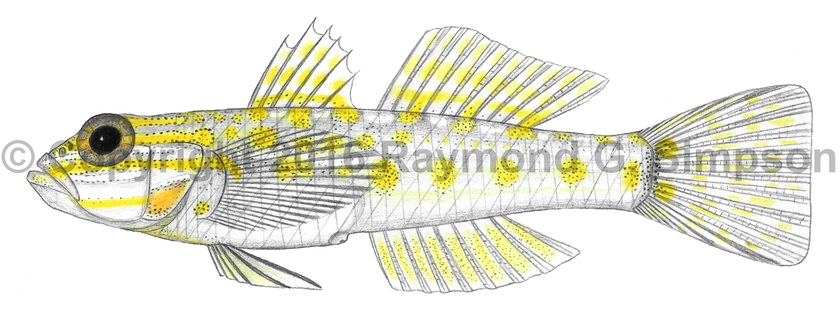
Common Name
Yellow-spotted Goby
Year Described
Baldwin & Robertson, 2015
Identification
Dorsal Fin: VI; I, 9-10 (usually 10)
Anal Fin: I, 9
Pectoral Fin: 19-20 (usually 19)
Pelvic Fin: I, 5
Caudal Fin: 17 segmented rays
Lateral Line Scales: 22
Vertebrae: 9+17=26
Body elongate. Snout profile straight. Eyes large and placed dorsally. Fleshy ridge present on nape is weakly developed. Anterior nostril tubular. Posterior nostril not tubular. Mouth small. Tongue truncated. No teeth on vomer or palatine. Teeth in jaws present in several irregular rows. Gill membranes joined to isthmus. Pectoral, soft dorsal, and anal fins with all rays branched and bound by membranes (first element simple). Second dorsal base longer than caudal peduncle length. Ventral fins fused into disk basally with all rays branched. Body covered in ctenoid scales, becoming cycloid on chest. Head and nape naked. Head pores present (one between eyes and one pair between rear nostrils). No lateral line.
Color
Body pale translucent with gut and spinal column showing through body wall. There are 4 longitudinal rows of yellow blotches and spots. The top row consists of equally spaced yellow spots along dorsal midline. The second and third rows are larger spots that are more irregular in placement running from eye to under the soft dorsal fin. The lowermost row has the largest blotches on lower half of trunk. The yellow blotches are sprinkled with numerous black melanophores. Alternating yellow and pearly lines run through eye and connect with lines of spots on rear of head. Pearly blue spots on lower body and around gut area. Fins with faint yellow lines/spots and black melanophores. Base of tail with small brown blotch. Eye bronze.
Size
Maximum size to 33.3mm SL.
Habitat
On mixed sand and rubble substrates on deep reef slope (70-80m). The deepest known W. Atlantic member of this genus.
Range
So far known only from off Curacao in the southern Caribbean Sea.
References
Baldwin C.C. & D.R. Robertson. 2015. A new, mesophotic Coryphopterus goby (Teleostei, Gobiidae) from the southern Caribbean, with comments on relationships and depth distributions within the genus. ZooKeys 513: 123-142.